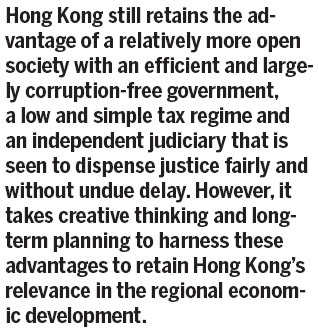Advantage turned handicap
Updated: 2013-05-23 05:31
By Hong Liang(HK Edition)
|
|||||||
It's not that Hong Kong is losing its advantage, as some economists think, but that Hong Kong's primary advantage has now become its worst handicap.
We're talking about Hong Kong people's preoccupation with short-term gains. In the past, when times were good, this attribute was shrouded in various accolades ranging from flexibility to quick-mindedness. Indeed, Hong Kong people's capability to quickly adapt to a changing market environment stemmed at least partly from their mostly short-term business plans.
It is often said that a five-year period is considered long-term in Hong Kong. Such mentality worked well when Hong Kong was competing with neighboring economies, including South Korea, Taiwan and Singapore, as a low-cost manufacturing base producing consumer goods for export to markets in the United States and Europe.
The predominant manufacturing sector in those days was made up of many thousands of small factories making wigs, plastic flowers, toys and garments. Lacking land and devoid of any form of government subsidies, Hong Kong factory owners could only survive by limiting themselves to labor-intensive jobs that didn't require large investment for plants and machinery.

Short-term planning was built into such business models that were designed to facilitate rapid switches of products to meet changes in market fads. Thousands of wig factories closed down in the early 1960s only to resurface a few months later making plastic toys or garments.
By the 1970s, Hong Kong manufacturers had amassed large capital from export earnings and gained insightful expertise in foreign trade. These assets gave them tremendous advantage in contributing to and benefiting from the industrialization of the Pearl River Delta region in the 1980s.
The transformation from a low-cost manufacturing base following the exodus of factories to Shenzhen and other areas was smooth and rewarding, thanks to Hong Kong people's flexibility. Hundreds of thousands of laid-off manufacturing workers quickly adapted to their new jobs in the rapidly expanding services industry.
But the problems arising from an imbalanced economy are coming home to roost. Over-dependence on property and finance to drive economic growth has concentrated wealth in the hands of a small minority that has gained a stranglehold on a large share of capital. The continuous shrinking of the real economy has greatly restricted social mobility, providing fewer opportunities for the majority have-nots to move up the economic and social ladder.
This has brought some economists and politicians around to the view that long-term planning is needed to revitalize the real economy and develop the capability to exploit opportunities arising from the changing economic landscape on the mainland.
To be sure, Hong Kong still retains the advantage of a relatively more open society with an efficient and largely corruption-free government, a low and simple tax regime and an independent judiciary that is seen to dispense justice fairly and without undue delay. However, it takes creative thinking and long-term planning to harness these advantages to retain Hong Kong's relevance in the regional economic development. There is no lack of capital in the region and the many entrepreneurs on the mainland and elsewhere have become just as quick as, if not quicker than, their counterparts in Hong Kong in identifying and exploiting opportunities for short-term gains.
Creativity and long-term planning have never been the strong suit of Hong Kong's private sector. Big businesses, mostly controlled by a few property tycoons, are addicted to monopolies. Having secured a virtual monopoly in terms of supply of properties, these businesses are diversifying mainly into the utility monopolies to maximize their profits without having to worry about expenses on the development of products and services.
The government, which derives a substantial part of its revenue from properties, doesn't even have a credible economic plan, either short- or long-term. All it does is wait, hat in hands, for others to pass onto it any business that the donors deem beneficial to both.
In that way, the criticism is correct. Hong Kong has lost its advantage.
The author is a current affairs commentator.
(HK Edition 05/23/2013 page9)